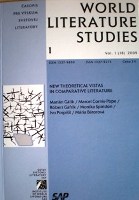The Permanent Crisis. Or Can, Could or Should Comparative Literary Studies Survive?: Between History, Theory and Area Studies
The Permanent Crisis. Or Can, Could or Should Comparative Literary Studies Survive?: Between History, Theory and Area Studies
Author(s): Ivo PospíšilSubject(s): Literary Texts
Published by: Ústav svetovej literatúry, Slovenská akadémia vied
Keywords: Komparatistika; Krize komparatistiky; Porovnávání; Metodologie; Areálové studie; Frank Wollman; Dionýz Ďurišin
Summary/Abstract: ‘A spectre is haunting Europe – the spectre of comparative literary studies.’ Such may be said, with only a little exaggeration, of the current state of the method and discipline. If we take into account that comparative literary studies only really came into existence at the time of positivism as well as the still surviving conception of literary history and evolutionary visions of genre studies later called by Paul van Tieghem “genologie” (a term hard to find in any French dictionary now), the development and contemporary state of literary criticism might be termed as a massive return to and, at the same time, revaluation of positivist concepts. This is confirmation of the fact that positivist literary criticism created basic methodological tools and visions and with these elaborated the problems of literariness and the poetic language of literary works while its post-postmodernist stage faces the challenge of the formation of new concepts of literary criticism via permanent returns and revaluations. Comparative literary studies (as we also have to take into consideration comparative biology, law or political studies) have had a long and colourful history. Unlike the above-mentioned disciplines, it represents three positions: an approach, a method and an autonomous discipline of literary scholarship or criticism with an elaborate system of terminology and methodological tools. While the nineteenth and twentieth century manifested three stages of development — the cultural historical, positivist and morphological/eidological/formalist/ poetological/immanent and, last but not least, receptionist /hermeneutical — the recent stage has been represented by the dialogue of cultures, area studies and the revaluation of literary theory and history or, moreover, theory of literary history.
Journal: World Literature Studies
- Issue Year: I/2009
- Issue No: 1
- Page Range: 50-61
- Page Count: 12
- Language: English

